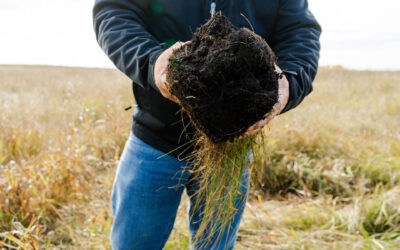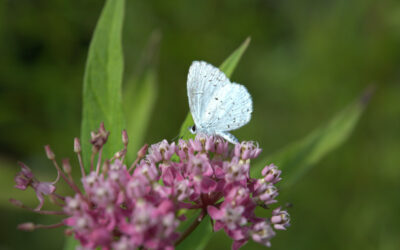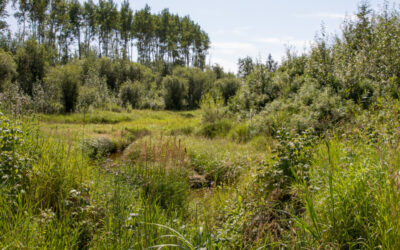ALUS Flagstaff hosted 22 members of ALUS Canada’s Western Hub for two jam-packed days of learning, collaboration and problem-solving in Alberta.
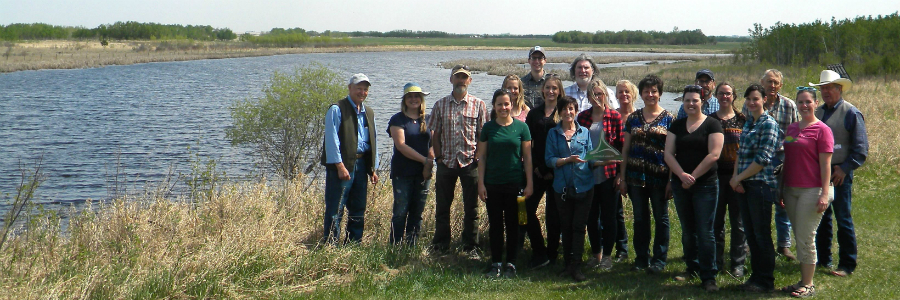
ALUS Canada’s Western Hub Conference held lunch at Sunrise Farm, where ALUS Flagstaff participants Don and Marie Ruzicka manage their 800-acre farm holistically and organically. The Ruzickas explained that they consider nature to be one of the crops they produce—in fact, nature is possibly their most important crop of all.
Where else but at ALUS Canada’s Western Hub Conference can someone learn how to build a bat box, tour innovative ALUS projects in the beautiful Alberta countryside, and exchange ideas with some of the most dedicated ALUS staffers in the world?
Earlier this year, ALUS Flagstaff hosted 22 members of ALUS Canada’s western family for two jam-packed days of learning, collaboration and problem-solving.
Organized by ALUS Canada’s Western Hub Manager Christine Campbell in collaboration with ALUS Flagstaff Program Coordinator Kelsey Fenton, the May 15-16 conference featured extensive ALUS discussions, partner presentations, a bat box construction workshop and a field tour of ALUS projects in Flagstaff County.
“This annual get-together is a chance to see everyone face to face, set up networking opportunities and share information,” said Campbell. “We succeeded in meeting all our goals, but as always, the sharing process generated additional value that we hadn’t expected.”
On day one, the ALUS team learned how to make bat boxes. And not just any bat boxes, but four-chamber bat maternity boxes using blueprints from the Alberta Community Bat Program. This “make-and-take” activity was designed to encourage Program Coordinators to organize similar events in their ALUS communities, teaching school groups to build bat boxes, bird boxes or bee hotels.
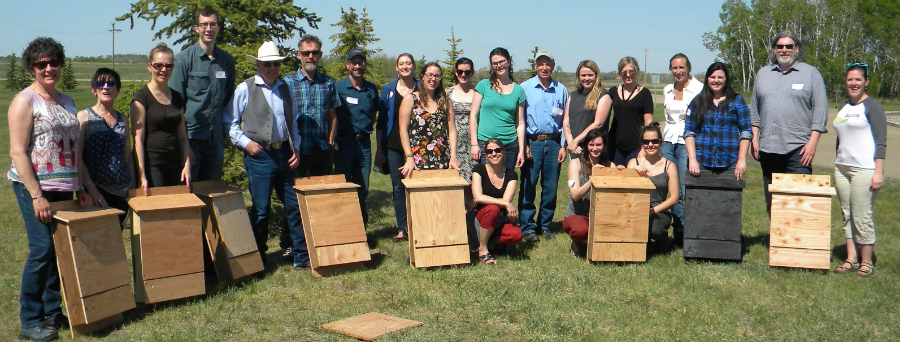
Conference attendees show off the results of their bat-box construction workshop, using blueprints from the Alberta Community Bat Program. As part of ALUS Canada’s Western Hub Conference, this “make-and-take” activity was designed to encourage Program Coordinators to organize similar events in their ALUS communities.
On day two, the group attended a short field tour. The group stopped for lunch at Sunrise Farm, where ALUS Flagstaff participants Don and Marie Ruzicka manage their 800-acre farm holistically and organically. The Ruzickas explained that they consider nature to be one of the many crops they produce—in fact, nature is possibly their most important crop of all. Clearly, ALUS is a natural fit for them.
For the second stop of the field tour, the group explored an ALUS project along a tributary of Iron Creek, where a riparian buffer zone is being established. The farmer planted willows by taking six-foot cuttings from a nearby clump of healthy willow and driving the branches two feet into the ground. By the next spring, tiny green buds had already emerged from the wooden stakes.
As Program Coordinator Kelsey Fenton explained, this ALUS project is in its very early stages: the ALUS participant is planning to enroll more marginal cropland into ALUS to extend this riparian buffer and provide many ecosystem services: It will help improve bank stability, reduce soil erosion and prevent agricultural run-off into the Creek, which will help to improve water quality and wildlife habitat—as evidenced by the mallards swimming by during the ALUS tour.
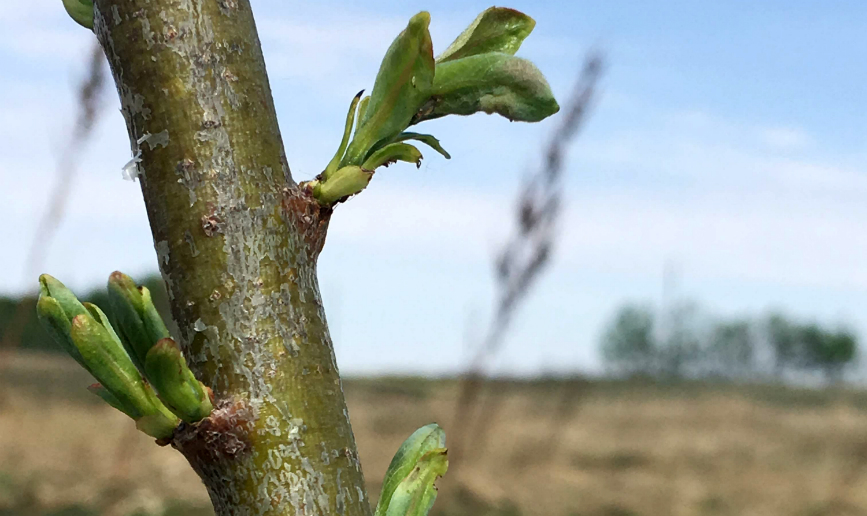
Tiny green buds emerge from willow cuttings that have been successfully established in an ALUS Flagstaff riparian buffer zone project, located along a tributary of Iron Creek. Over the coming years, this ALUS project will provide many ecosystem services, such as cleaner air, cleaner water and more biodiversity, by helping to improve bank stability, reduce soil erosion and prevent agricultural run-off into the Creek.
Back in the meeting room, the group discussed ALUS’ new and existing partnerships with other organizations, such as the University of Calgary and the Food Water Wellness Foundation, who shared their exciting plans for a more cost-effective form of soil-carbon mapping.
“It’s in the nature of the ALUS program for each community to develop novel solutions to local environmental issues,” said Campbell. For example, one community spoke about their decision to turn an old cattle barn into an ALUS habitat project to protect the bats roosting inside, while others are considering special types of ALUS projects that would help reduce the spread of clubroot, a serious soil-borne disease.
In addition, ALUS Red Deer County’s Tom Towers and Ken Lewis (PAC Chair and Program Coordinator, respectively), as well as ALUS Parkland’s Program Coordinator Jennifer Caudron, shared their experiences in piloting the role of a Farmer Liaison for their ALUS programs.
By holding annual conferences in each of its three regional hubs, ALUS Canada encourages the cross-pollination of ideas between 21 unique ALUS communities, helps ensure that national tools, advocacy, policies and values are shared by every ALUS community and, most importantly, solidifies the growing ALUS family.

